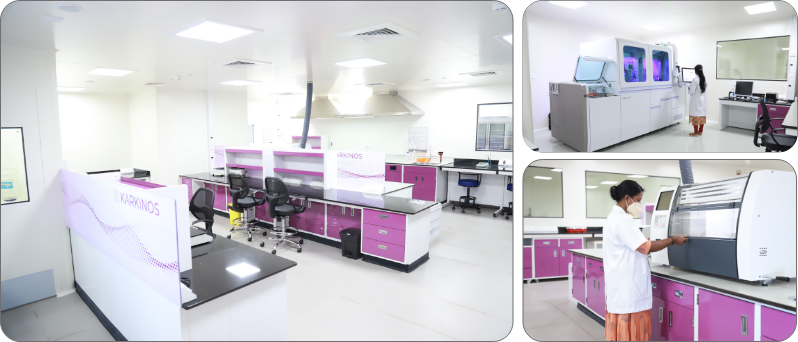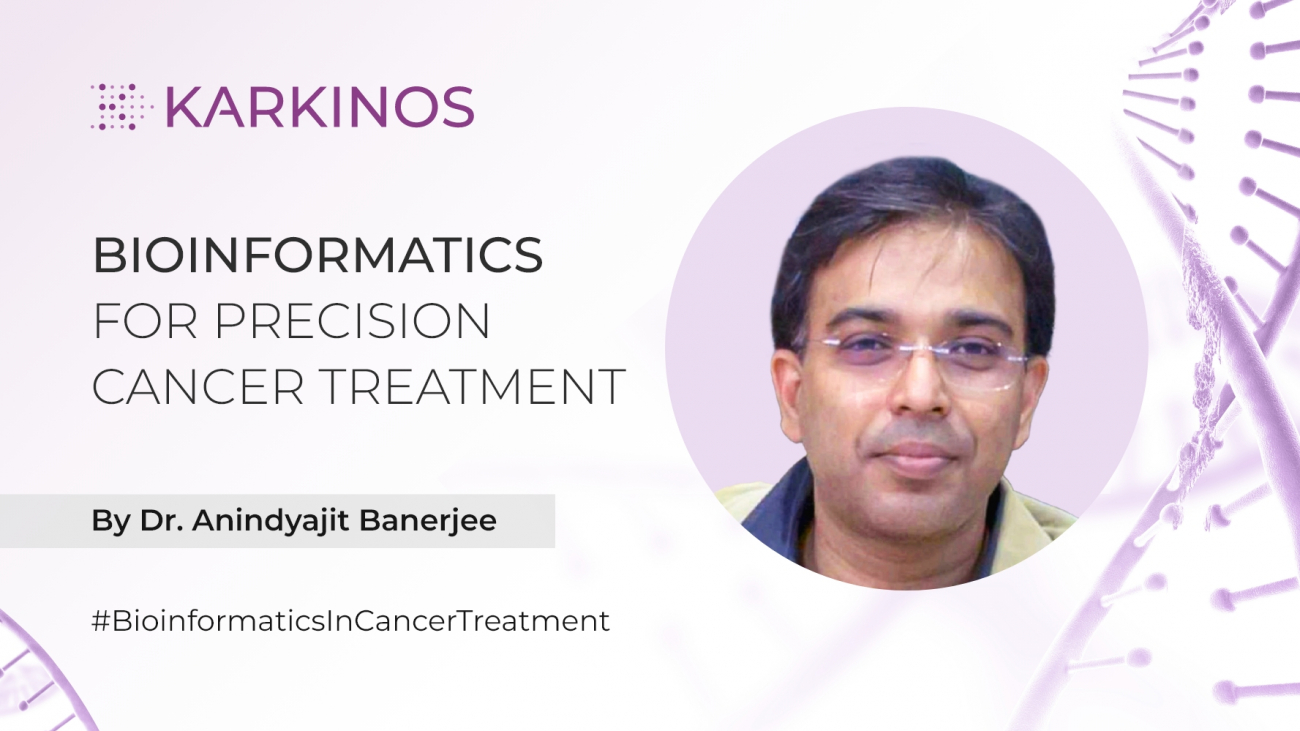Bioinformatics – bridging lab and clinic for personalized medicine
By Dr. Anindyajit Banerjee, Head – Bioinformatics, Karkinos Healthcare
Cancer is a disease of the genome caused by alteration of genomic bases or mutations in the genes. These changes cause the cells to grow uncontrollably leading to cancer. Although the body’s cell machinery is designed to constantly find and fix mutations during the process of cell division, on rare occasions or due to some risk factor’s effect, some mutations slip through our cells’ repair machinery, perform imperfectly leading to the formation of benign or malignant tumors.
Researchers from across the world are now convinced that the study of cancer at the genome level is important to establish the cause of the disease and as well as for innovating new targeted treatment protocols to save lives or improve the Quality of Life.
Genome study, therefore, forms the basis of understanding cancer biology. In recent times, the progress in scientific knowledge about the biology of cancers and the advances in DNA sequencing technology are now leading to a new understanding of cancer and newer ways for diagnosing and treating the common cancers.
Today, we are able to detect cancers by testing just a blood sample. We are also moving towards treating cancers not by where they are found in the body, but by how their genomes have been modified to cause cancer. Such studies are aided by bioinformaticians, who have an important role to play in the sequence of events from diagnosis to planning specialized treatment protocols.
Bioinformatics forms the translational bridge between the patient’s sample and the treatment options available to the clinician for best management of the cancer condition in a patient.
Bioinformatics – a silver bullet in cancer treatment
Cancer bioinformatics deals with the collection and analysis of biological data from cancer patients, which can lead to better characterization of the disease based on different molecular subtypes, thereby allowing clinicians to tailor treatment accordingly, instead of a ‘one-size-fits-all’ therapy.
We can say that bioinformatics forms the translational bridge between the patient’s sample and the treatment options available to the clinician for best management of the cancer condition in a patient.
A strong bioinformatics tool can help:
a) To rearrange the biological data in a simple manner that helps biologists and researchers to store and access information;
b) To develop elegant software that help with the analysis and management of data;
c) To use these biological data within the analysis and interpretation of the results in a biologically meaningful manner;
d) To assist researchers within the pharmaceutical industry to understand the protein structures that lead to the development of new drugs; and
e) To help and assist physicians within the medical fields to understand gene structures that can help in detecting and diagnosing cancer.
Hence, we can derive that bioinformatics is a requisite in the molecular understanding of cancer-causing genes (inactivation of proto-oncogene). Genomic profiling cues for cancer precision medicine by charting a significant focus on finding discrete driver mutations that are associated with therapeutic targets or that are of diagnostic or prognostic value.
Certain genes called proto-oncogenes may develop specific mutations in DNA and therefore become hyperactivated-leading to uncontrolled cell growth resulting in cancer. Bioinformatics can help in the identification of these changes in DNA between normal versus diseased states and therefore can help clinicians in predicting risk group assignment and therapeutic options for disease management. Examples like BRCA mutations, JAK2 mutation, KRAS mutation, NRAS mutation, TP53 mutation, and tyrosine kinase inhibitors.
In addition to genomics, transcriptomic analyses can be used to define gene expression profile signatures that can be used to identify tumors that are more likely to respond to immune-oncology agents. Furthermore, the detection of gene expression networks and of the activity of oncogenic pathways along with fusion and also mutation detection through transcriptomic analyses can add a more functional tumor profiling that can ultimately increase treatment opportunities.
This is why gene sequencing is an important diagnostic step in cancer diagnosis. Sequencing the cancer genome is a powerful tool in precision medicine, but genetic sequence alone does not reveal how genes are differentially regulated. Cancer development has been associated with abnormalities in complex epigenetic pathways, including DNA methylation, histone variations and modifications, and nucleosome remodeling.
Advances in sequencing technologies such as Whole Genome Sequencing (WGS) have facilitated the simultaneous detection of single nucleotide variants (SNV), Copy Number Variation (CNV), and structural rearrangements such as inversion, translocation, insertion, and deletion leading to a greater diagnostic yield of actionable findings in tumor samples.
Genomic profiling plays an important role in cancer diagnosis. It looks for similar signatures of gene expressions or looks for some genomic markers among the sets of genomic variants in a cohort of cancer patients. Mutational signatures expand genomics beyond the simple focus of discrete variant detection where risk profiles can be reported in numerous cancer types. The understanding of the presence of genomic aberrations affecting specific immune signaling pathways or genes that will lead to immune dysregulation is also critical. This will be informative in understanding the response of the immune system’s fight against cancer cells
Immune checkpoint inhibitors provide efficient clinical responses in multiple forms of cancer. Various factors like tumor microenvironment, tumor immunogenicity, antigen presentation and other pathways play significant roles in response and resistance to immune checkpoint blockade. In-depth study of resistance mechanisms to immune checkpoint can help us in overcoming drug resistance and treatment failures.
Bioinformatics-based personalized treatment
An efficient informatics architecture is needed to support personalized medicine by recording, managing, and analyzing all the patient information collected. With specific relation to personalized care development, bioinformatics is needed:
(i) at the technical level to develop a powerful computational architecture;
(ii) at the organizational and management levels to define the procedures to collect data with highest confidence, quality, and traceability; and
(iii) at the scientific level to create sophisticated mathematical models to predict the evolution of the disease and risks to the patient as well as the community.
Another advantage that can be leveraged by using bioinformatics is the ready availability of patient data, which is the most critical resource for planning a personalized therapy. Majority of the data from cancer diagnostics is fragmented, siloed, and compartmentalized. Bioinformatics becomes a necessity to fix these issues. The tools used in bioinformatics focus on developing a comprehensive system for integrating the analyzed data from different centers, so that it can be accessed from anywhere across the country. Any treating clinician or researcher should be able to query the information for the benefit of the patient and for equity of healthcare and the cancer community from a broader perspective.

Bioinformatics in Karkinos – For personalized cancer treatment
Karkinos Healthcare is keen on delivering personalized medicine and personal care in cancer treatment. For this purpose, Karkinos Healthcare has established the Advanced Center for Cancer Diagnostics and Research that will serve as a central lab for the global oncology network, analyzing specimens at the molecular and genomic level to aid in personalized targeted therapy. Predicting possible response to treatment as well as to evaluate response by liquid biopsy will be the lab’s core area of work, in which the tools of bioinformatics will play a very important role.
Cancer detection and diagnosis, therefore, involves identifying the presence of cancer in the body and assessing the extent of disease—whether it is the initial diagnosis of cancer or the detection of a recurrence. For some cancers, this definition can be expanded to include identifying precancerous lesions that are likely to become cancerous, providing an opportunity for early intervention and preventing cancer altogether.
Effective screening tests for early detection do not exist for many cancers. Early detection is a proven strategy for saving lives from cancer. Some patients whose cancers are detected and treated early may have better long-term survival than patients whose cancers are not found until symptoms appear.
Once the presence of cancer is verified, diagnostic tools that identify specific molecular abnormalities in tumors are also important in the context of precision medicine. With this information, clinicians can determine whether a patient may be a candidate for specific therapy and in line with this Karkinos Healthcare is building such a provision for the benefit of early cancer detection.
The lab is responsible for:
a) development of sustainable and automated, single-click bioinformatics analysis pipelines;
b) development of dedicated computational and statistical models for predicting the occurrence of cancer, early diagnosis, and the course of treatment;
c) development of a database with a decentralized approach to the cancer patients of the Indian population;
d) building a team of bioinformaticians to help in cancer treatment and clinical onco-research; and
e) to provide proper interpretation to the Tumor Board upon inferring significance of the genomic variants detected using genomic profiling of the patient.
We can easily conclude that the tools of bioinformatics are an asset to precision cancer treatment – the need of the hour. But there are several challenges that need to be faced to make it a reality. Maintaining an efficient bioinformatics workflow in the context of personalized medicine is challenging because of the frequent updates of the computational solutions either installed on the sequencing machine or provided as standalone applications.
Seminal research studies indicate that an integrative analysis, considering the multidimensional nature of the cancer (genome, proteome, epigenome etc.), is needed to unravel the complexity of the disease and identify the most efficient treatments. Translational bioinformatics and precision medicine will keep on challenging the conventional understanding of standard models of cancer behavior and health, demanding skilled workforce and execution to make a lasting impact with desired outcomes in reality.
